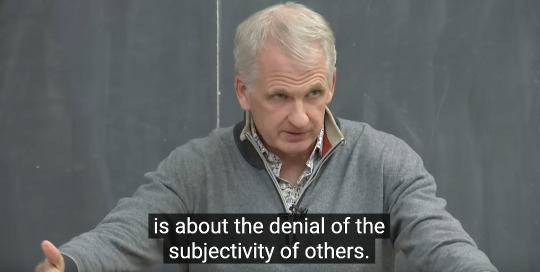Text
it is so funny to me how i started learning english on my own age 10 because the manga i was reading was turning so so so bad i went to fan content to cope with how shit it was. and 15 years later this pays off as my boss tells me i'm an essential asset in the team as the only fluent english-speaker.
3K notes
·
View notes
Text

Is My Husband a Doormat? (Lidija Hilje, The New York Times, March 14 2025)
"He had been irritable for days because of an Enneagram personality test I’d sent him a link for.
When he came out of our room with his results, his face was ablaze, furious, which was odd: My husband is the calmest, most easygoing person I know.
“I’m a Nine,” he said with disdain. “The Peacemaker.”
“That’s great,” I said, a bit envious. I was a Four, the Individualist, what seemed to me to be a frivolous and self-serving type compared to the altruism and kindness of a Peacemaker.
“I’m an official people-pleaser,” he said. “My personality is a doormat.”
That whole day he brooded over his results, and I found it hilarious. Who in their right mind gets upset about a pop-psychology personality test?
“That’s what I love the most about you,” I said. “That you are understanding, collaborative, considerate.”
But he shook his head as if I didn’t understand it, didn’t understand him.
And in the following days, he grew increasingly irritable, bursting with annoyance when he had to take out the trash, or when the children didn’t line up like soldiers the moment he barked orders to “Brush teeth!” or “Go to bed!”
It culminated on the day of the fight, when he spewed those words at me, that I’d been abusing him.
When he said that, I laughed — the accusation was ludicrous. (…)
Over the years, my husband told me stories from his childhood that he thought were normal but struck me as neglectful or that made him feel like a burden, like his mother not visiting him in the hospital when he was a toddler or acting as though his lunch money for school was a big expense.
My husband cut ties with his parents some years ago, but only after I grew upset at the way they treated me. I guess he hadn’t deemed himself worth fighting for.
He may have cut ties, but the feeling of being a burden remained. He was still censoring himself, making himself invisible by not asking for anything.
It wasn’t that I was controlling. It was that he was preemptively trimming his own wings before even asking for what he wanted or needed — and then resenting me for it.
I came back home to find my husband sitting on the couch with his head in his hands.
He looked at me, all the fight already drained from him. “I’m sorry I took it all out on you,” he said.
“You weren’t abusing me. I can’t believe I said that. That damn Enneagram. It really got to my head.”
He had been doing some reckoning of his own while I was away, and he realized why the Enneagram had triggered him so much: It hadn’t shown him the person he was but the person his childhood experiences had conditioned him to be.
And there was a deep chasm between those two versions.
After the Enneagram held that mirror up to him, he couldn’t reconcile himself to it, but he also didn’t know what to do about it. It overwhelmed him completely.
“I thought that cutting ties was enough,” he said. “But there’s still work. So much work.”
“I know,” I said, and held him."
#I remember when I got my 3 (which held even after I familiarised myself thoroughly with the system)#oh that was grim#not 1 or 5 or even 4#THREE#and it was so obvious that there was no bullshitting myself
19 notes
·
View notes
Text
i wonder if actors ever get their scripts and are like
well this is fucking stupid
1M notes
·
View notes
Text


Pier Paolo Pasolini and Orson Welles on the set of La ricotta (1962).
854 notes
·
View notes
Text
3 Years
I can't believe it's been 3 years. 3 years since I woke up to sirens. 3 years since my life was torn apart. 3 years but I am still here.

50 notes
·
View notes
Text
I cannot trust the artistic opinions of anybody who can't frankly admit that the vast majority of whatever's produced in their chosen medium (books, film, etc) is unsalvageable pigslop. But also that dogshit amateur art is critical for said medium. AND that pigslop and amateur dogshit is different
12K notes
·
View notes
Text




Timothy Snyder: The Making of Modern Ukraine. Class 23. the Colonial, the Post-Colonial, the Global
825 notes
·
View notes
Text
#a list of some of the most unfuckable career paths imaginable (except the union factory worker)#and then we've got the top two divided between people who have actually fucked and those who have only imagined doing it
449 notes
·
View notes
Photo








To be a scientist is to be naive. We are so focused on our search for truth, we fail to consider how few actually want us to find it. But it is always there, whether we see it or not, whether we choose to or not. The truth doesn’t care about our needs or wants, it doesn’t care about our governments, our ideologies, our religions. It will lie and wait for all time. And this, at last, is the gift of Chernobyl. Where I once would fear the cost of truth, now I only ask ‘what is the cost of lies?’
Chernobyl (2019) – Episode 5 “Vichnaya Pamyat", dir. Johan Renck
1K notes
·
View notes
Text
youtube
I am everyone at that bar today
0 notes
Text
consuming mass amounts of media related to my hyperfixation isnt enough i need to eat it
48K notes
·
View notes












